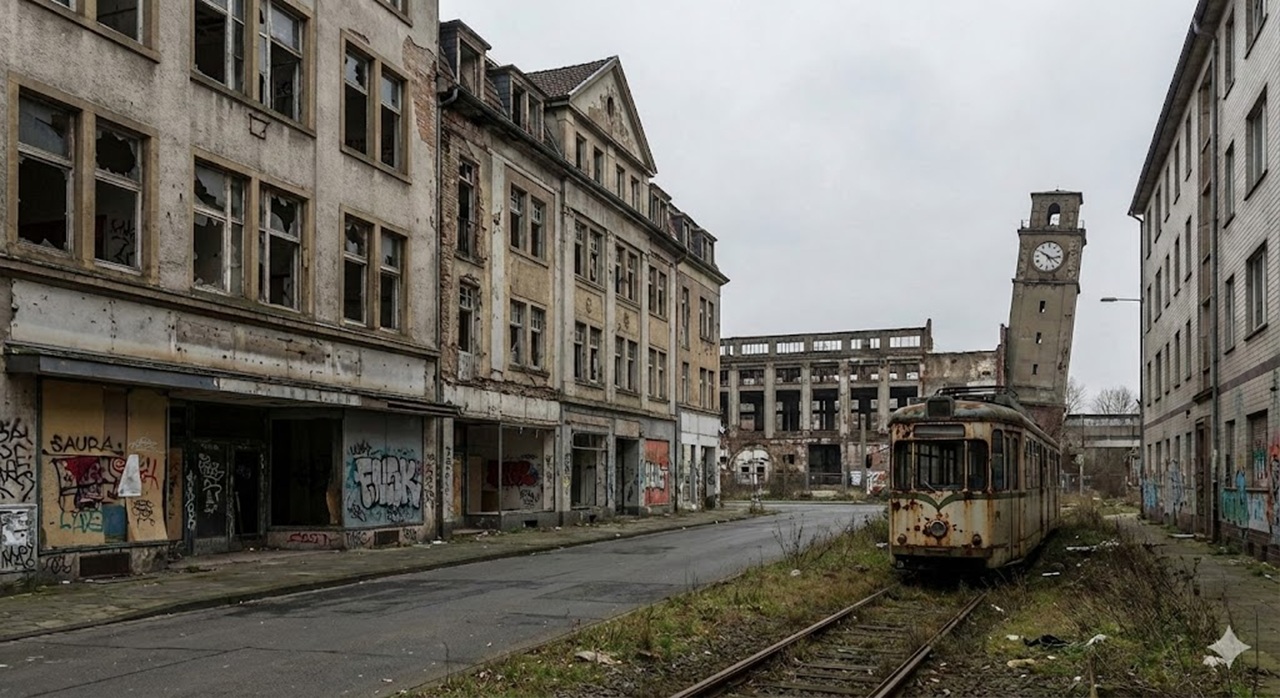International
The Great German Bluff: Bankrupt municipalities, collapsing welfare, and the “Merz Cure” that is sinking cities

Germany is facing a silent crash: almost all municipalities are bankrupt. Between skyrocketing welfare costs, the migration crisis, and Merz’s austerity policy that shifts problems onto local authorities, the German model is collapsing. Here are the figures behind the disaster that Berlin is not talking about.
Germany is no longer the engine of Europe, but risks becoming its derailed carriage. While Berlin discusses grand schemes and Chancellor Friedrich Merz preaches fiscal rigor and discipline, an unprecedented financial drama is unfolding at the base of the administrative pyramid. German cities, the backbone of the country’s productive and social system, are technically bankrupt.
This is not alarmism, but arithmetic. And as we know, mathematics is the only subject that does not bow to political rhetoric.
The deep defeat of North Rhine-Westphalia
Let’s start with the raw data coming from the industrial heart of Germany: North Rhine-Westphalia. In this state, which should be the driving force of the economy, the situation is bleak. Out of 396 cities and municipalities, how many manage to present a balanced budget? Just ten.
You read that right. Less than 3% of local governments manage to close their accounts without going into the red. Thomas Kufen, mayor of Essen (CDU) and member of the party’s federal executive, has sounded an alarm that sounds more like a de profundis: “Almost all German cities are now on the brink of bì
The total deficit of German cities for 2025 is expected to be €30 billion, a sharp deterioration from €24 billion the previous year. This gap is widening as GDP stagnates and tax revenues, particularly the Gewerbesteuer (business tax), plummet due to deindustrialization. The federal budget is built on the ruins of local administrations.
The deadly gap: lower revenues, skyrocketing expenses
The crisis is not due to the reckless management of spendthrift mayors, but to a perfect storm triggered by decisions taken at the federal level and casually dumped on the shoulders of local governments. It is the classic game of buck-passing, in which the last link in the chain – the one closest to the citizens – is left holding the baby.
The causes of the disaster can be summarized in three major items that are draining municipal coffers:
- The cost of immigration and integration: Contrary to the narrative that saw immigration as the solution to the demographic and pension crisis, the immediate costs are proving to be a millstone. For housing, integration, and subsidies alone, the national bill is at least €50 billion per year. These costs fall on local administrations.
- Increased personnel costs: Salary adjustments in the public sector, necessary to combat inflation, have caused current expenditure to skyrocket. Again, contractual decisions were made in Berlin and simply imposed on municipalities.
- Inflation in operating costs: From energy to construction, every service costs significantly more than it did two years ago.
The Essen case: a mirror of Germany
Take Essen, a city of almost 600,000 inhabitants. The plan was to have a balanced budget by 2025. The reality? A deficit of €123 million. Mayor Kufen was forced to impose “restrictive budget management.” In practice, the municipality only pays what it is legally obliged to pay (salaries and social assistance). For any other expenditure exceeding €5,000, special permission from the treasurer is required. Everything that is not strictly necessary is cut, but this means that the municipal administration loses its significance, without financial autonomy.

Essen, Westphalia
We are effectively under receivership.
And this is where the welfare paradox comes into play. Essen’s official statistics show a reality that federal politicians are reluctant to admit publicly so as not to upset the balance of “political correctness,” but which the budgets mercilessly record:
- In primary schools, 24.5% of students are classified as ‘non-German’. If those with a migrant background are included, the figure rises to 35%.
- These students need integration courses and extra support, increasing the per capita cost of education.
- Nationally, around 63% of all welfare recipients are foreigners or have a foreign background.
These are not moral judgments, they are cost items. And when revenues fall because industry slows down, these cost items become unsustainable. The municipality can only turn to the federal government.
Merz and the federal government: “Work it out yourselves”
And what is the response of the central government, now led by Friedrich Merz? A policy that could be described as “selective austerity.” While preaching austerity, they leave the municipalities gasping for air. The federal aid package for Essen amounts to €335 million spread over 12 years. Doing the math: €28 million per year. As Mayor Kufen ironically pointed out: “With that money, if we’re lucky, we can build two and a half schools.”
The problem is structural. Merz and the federal government are maintaining a hard line on the state budget, offloading social costs onto municipalities without providing adequate resources to cover them. It is the classic short-sighted neoliberal strategy: the central budget looks healthy, investing heavily in armaments, but the system is collapsing from the ground up.
If municipalities cannot invest, cannot maintain roads, cannot guarantee nurseries or public lighting, the local economy will decline further. It is a textbook vicious circle of recession, which no serious economist would hesitate to condemn.

Will Germany be reduced in this way?
The Social Consequences: When the State Disappears
Mayor Kufen touched on a key point: “If I can’t guarantee a place in kindergarten or if the streetlights don’t come on in the evening, taxpayers get the impression that politicians are not doing their job. And that is dangerous for democracy.”
When the state withdraws from essential services due to lack of funds, the social contract is broken. In Essen, it is not only the municipality that suffers, but also the citizens. The number of “over-indebted” people (those who cannot repay their debts) has reached 5.7 million nationwide, a growing trend for the first time in six years. Skyrocketing rents, energy and food prices are eroding the middle class, and when the middle class falls, society falls.
A model to rethink
Germany is at a crossroads. Continue with the policy of “Schwarze Null” (the fetish of a balanced budget) at the federal level while cities die, or accept that the economic model based on exports, low public investment, and generous welfare financed by perpetual growth is over.
The current policy of offloading the costs of welfare and reception onto municipalities, without adequate fiscal transfer, is not only unfair: it is economically suicidal. If cities fail, Germany fails. And if Germany fails, Europe is in serious trouble. But perhaps, in Berlin, some still think that balancing the federal budget is enough to save face.
Questions and answers
Q: Is the deficit in German cities caused solely by local administrative incompetence? A: No, it is a structural problem, not a management one. Municipal revenues (linked to local economic performance) are falling due to the recession, while mandatory expenditures imposed by the federal government (social subsidies, integration, wage adjustments) have exploded. Municipalities do not have sufficient fiscal leverage to cover this gap created at the central level (the “scissors” between revenue and expenditure).
Q: How much does immigration really affect local budgets in Germany? A: The impact is very significant. In addition to the direct costs of housing, which are borne by the municipalities, there are indirect costs for education and welfare. With an estimated national expenditure of €50 billion per year and a very high percentage of subsidy recipients among the foreign population (63%), municipalities find themselves having to provide expensive services without receiving adequate transfers from the federal government to cover them.
Q: What are the political risks of this municipal financial crisis? A: The main risk is the delegitimization of democratic institutions. If the municipality, the body closest to the citizen, fails to provide basic services such as lighting, schools, and security, taxpayers perceive the state as failing. This fuels distrust in traditional politics and encourages the growth of protest or extreme parties, creating social instability at an already fragile economic time.






